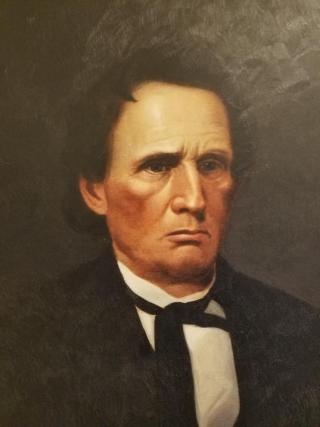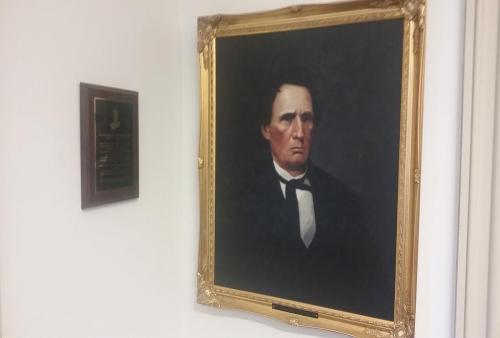Thaddeus Stevens - Gettysburg's Most Prominent Resident

CREDITS: Written By Council Member Wesley Heyser
Edited By Council Member Patricia Lawson
Plaque & Portrait Provided by The Thaddeus Stevens Society
The Gettysburg Borough Council was presented with a plaque on April 9, 2018 to accompany a portrait of Thaddeus Stevens that hangs in the Gettysburg Municipal Building. The Thaddeus Stevens Society provided the portrait to the Borough of Gettysburg in 1999, and the plaque presentation by Ross Hetrick, president of the society, coincided with the 150th anniversary of the Fourteenth Amendment to the Constitution of the United States. Hetrick noted Stevens, who lived in Gettysburg from 1816 to 1842, was critical in the passage of the amendment, which provides for equal rights.
Thaddeus Stevens relocated from Vermont to Pennsylvania in 1815. After a year of study in York, he passed the bar examination in Bel Air, Maryland, enabling him to practice in Pennsylvania through reciprocity. Stevens moved to Gettysburg and opened an office here in September 1816.1 He gained attention in his new home for defending a local farmer who killed a constable with a scythe. While his client was convicted and executed, Stevens built a solid professional reputation.2 He became known across the commonwealth after winning nine of his first 10 cases to reach the Pennsylvania Supreme Court.3
Thaddeus Stevens was elected to the Gettysburg Borough Council in 1822, and was unanimously chosen as its president. He served six one-year terms between 1822 and 1831.4 Tax records indicate that by 1829 he was the wealthiest resident of the Borough, owning several properties.5 Stevens was elected as a member of the Anti-Masonic Party to represent the local area in the Pennsylvania House of Representatives in 1833.6
In Harrisburg Stevens gained fame as an adamant supporter of education. He helped obtain the charter for Pennsylvania College (now Gettysburg College) in 1832, and sold the institution land for a reasonable sum.7 After election to the legislature, he secured funds in January 1834 for the college from the state so that the college edifice (now Pennsylvania Hall) could be constructed. In turn, Stevens was chosen as a trustee of the college that April, and held the post until his death.8 Pennsylvania had become an early state to provide for a free public education, but the system was threatened with repeal by the state legislature in April 1835. Thaddeus Stevens delivered a dynamic speech on the floor of the house that left the members cheering and the school system intact.9
By 1842, Thaddeus Stevens was more than $200,000 in debt. This resulted from a combination of business failures, including difficulties with his iron furnaces, the Panic of 1837, a consistent inability to collect fees from clients, and regularly not recouping funds loaned to friends.10 Politically Stevens was also adrift, as the Anti-Masonic Party had finally collapsed and his desire for an appointment by President William Henry Harrison went unfulfilled.11 Political strife and scandals had also cost him dearly, including the events of Pennsylvania’s “Buckshot War” and the Gettysburg Railroad, which opponents referred to as the “tapeworm railroad”.12 Thaddeus Stevens sold his home and office in Gettysburg, left politics and relocated to Lancaster in order to earn enough money to pay his debts.13
In Lancaster Stevens prospered, resolved his financial problems and was elected to the United States Congress as a member of the Whig Party in 1848.14 Stevens had publicly opposed slavery since 1823, including during a Fourth of July toast in Gettysburg, stating that he desired the next president of the United States not be a slaveholder.15 During the struggle over the Compromise of 1850, Stevens correctly predicted that as slaveholders became increasingly marginalized, the states would eventually abolish slavery.16 He was briefly a member of the Know-Nothing Party after it absorbed the Whigs in 1854, but found his true home as a member of the anti-slavery Republican Party, which he joined in 1855.17
As a Republican, Thaddeus Stevens rose to become the chairman of the House Ways and Means Committee. During the American Civil War, this post made Stevens the most powerful member of the House of Representatives, responsible for designing and shepherding bills through the House that  would both raise the funds for the war effort and authorize the immense expenditures required to fight it.18 Confederate troops under the command of Jubal Early destroyed one of Stevens’ remaining holdings in Adams County, the Caledonia Ironworks, on their march toward Gettysburg in late June 1863.19
would both raise the funds for the war effort and authorize the immense expenditures required to fight it.18 Confederate troops under the command of Jubal Early destroyed one of Stevens’ remaining holdings in Adams County, the Caledonia Ironworks, on their march toward Gettysburg in late June 1863.19
With the Civil War drawing to a close in January 1865, Thaddeus Stevens delivered the final speech during the debate of the Thirteenth Amendment to the Constitution of the United States. As the leader of the Radical Republicans, Stevens had pressed the issue of abolition throughout his time in Congress, and on Jan. 31 secured victory with the passage of the amendment.20
After Lincoln’s death, Andrew Johnson rose to the presidency, and Thaddeus Stevens recognized him as an enemy. Within a year of Johnson assuming office, Stevens and the Radical Republicans had enough votes to override Johnson’s veto on a regular basis, beginning with the passage of the Civil Rights Bill of 1866.21 This conflict culminated in the impeachment of Andrew Johnson in 1868, during which Thaddeus Stevens served as one of seven members of the House that managed the impeachment proceedings.22 By this time, Stevens was physically weak to the point that he had to be carried through the Capitol on a chair. Johnson was acquitted in the U.S. Senate by one vote.23
Perhaps Thaddeus Stevens’s greatest victory came as the father of the Fourteenth Amendment.24 The amendment, among its notable provisions, extended equal civil rights to former slaves.25 Stevens gathered the 2/3 vote needed in the House to pass the amendment in1868, which ensured birthright citizenship, as well as the protections of life, liberty, property and equal protection of the laws for all Americans. He compromised by accepting the amendment without a suffrage provision, but accomplished the majority of his mission.26 The sesquicentennial of the adoption of the Fourteenth Amendment will be commemorated in 2018 when the Thaddeus Stevens Society holds a July ceremony in Lancaster, where Thaddeus Stevens is also buried.
Having spent 26 years as a prominent resident of the Borough of Gettysburg, Thaddeus Stevens, without a doubt, stands historically as one of its most important citizens. His early impact in saving Pennsylvania’s public education system and supporting what would become Gettysburg College would be sufficient to establish his local importance. Unfortunately, his critical role during the American Civil War, and more importantly, with both the Thirteenth and Fourteenth Amendments, is often lost on many Americans. As the father of the Fourteenth Amendment in particular, he is responsible for providing the constitutional basis of all following efforts to ensure equality for all people in the United States. As such, it is fitting that the portrait of such an important American, and former Gettysburg resident, should hang in the Gettysburg Municipal Building.
[1] Fawn Brodie, Thaddeus Stevens (New York: W.W. Norton & Company, Inc., 1966), 32.
[2] Fawn Brodie, Thaddeus Stevens (New York: W.W. Norton & Company, Inc., 1966), 32.
[3] Fawn Brodie, Thaddeus Stevens (New York: W.W. Norton & Company, Inc., 1966), 33.
[4] Charles Glatfelter, “Thaddeus Stevens in the Cause of Education: The Gettysburg Years”, Pennsylvania History 60, no. 2 (1993): 163.
[5] Fawn Brodie, Thaddeus Stevens (New York: W.W. Norton & Company, Inc., 1966), 38.
[6] Fawn Brodie, Thaddeus Stevens (New York: W.W. Norton & Company, Inc., 1966), 57.
[7] Fawn Brodie, Thaddeus Stevens (New York: W.W. Norton & Company, Inc., 1966), 59.
[8] Charles Glatfelter, “Thaddeus Stevens in the Cause of Education: The Gettysburg Years”, Pennsylvania History 60, no. 2 (1993): 167.
[9] Fawn Brodie, Thaddeus Stevens (New York: W.W. Norton & Company, Inc., 1966), 61.
[10] Fawn Brodie, Thaddeus Stevens (New York: W.W. Norton & Company, Inc., 1966), 75, 84-85.
[11] Fawn Brodie, Thaddeus Stevens (New York: W.W. Norton & Company, Inc., 1966), 82-83.
[12] Fawn Brodie, Thaddeus Stevens (New York: W.W. Norton & Company, Inc., 1966), 75, 79.
[13] Fawn Brodie, Thaddeus Stevens (New York: W.W. Norton & Company, Inc., 1966), 84.
[14] Fawn Brodie, Thaddeus Stevens (New York: W.W. Norton & Company, Inc., 1966), 103.
[15] Fawn Brodie, Thaddeus Stevens (New York: W.W. Norton & Company, Inc., 1966), 33.
[16] Fawn Brodie, Thaddeus Stevens (New York: W.W. Norton & Company, Inc., 1966), 110-111.
[17] Fawn Brodie, Thaddeus Stevens (New York: W.W. Norton & Company, Inc., 1966), 122-123.
[18] Fawn Brodie, Thaddeus Stevens (New York: W.W. Norton & Company, Inc., 1966), 150-151.
[19] Fawn Brodie, Thaddeus Stevens (New York: W.W. Norton & Company, Inc., 1966), 180.
[20] Fawn Brodie, Thaddeus Stevens (New York: W.W. Norton & Company, Inc., 1966), 203-204.
[21] Fawn Brodie, Thaddeus Stevens (New York: W.W. Norton & Company, Inc., 1966), 258.
[22] Fawn Brodie, Thaddeus Stevens (New York: W.W. Norton & Company, Inc., 1966), 340.
[23] Fawn Brodie, Thaddeus Stevens (New York: W.W. Norton & Company, Inc., 1966), 354.
[24] Fawn Brodie, Thaddeus Stevens (New York: W.W. Norton & Company, Inc., 1966), 10.
[25] Fawn Brodie, Thaddeus Stevens (New York: W.W. Norton & Company, Inc., 1966), 21.
[26] Fawn Brodie, Thaddeus Stevens (New York: W.W. Norton & Company, Inc., 1966), 238-240.
Inscription on plaque presented to the Gettysburg Borough by the Thaddeus Stevens Society on April 9, 2018:
"Six years on Gettysburg Borough Council, 1820s & 1831
Lived in Gettysburg 1816-1842, Lancaster 1842-1868
State Legislator and U.S. Congressman
Saviour of Pennsylvania Public Education for 1835 speech
turning back repeal effort
Most powerful Congressman during and after the Civil War
Instrumental in passage of the 13th Amendment abolishing
slavery
Father of the 14th Amendment mandating equal treatment
and civil liberties
A chief architect of southern Reconstruction
Spearheaded the impeachment of President Andrew Johnson"

